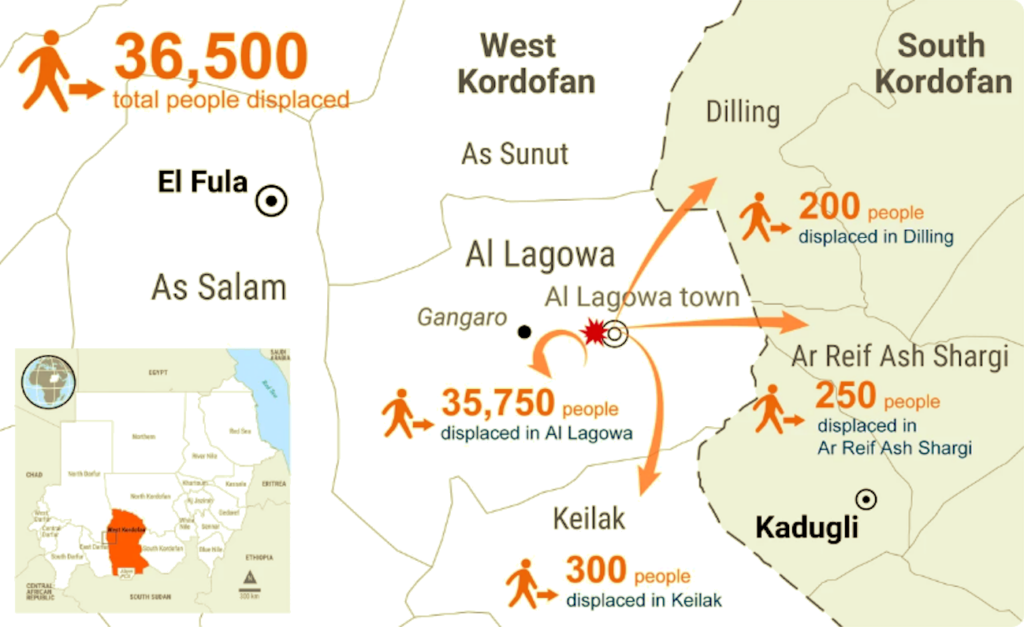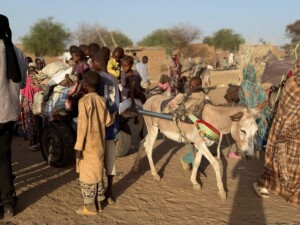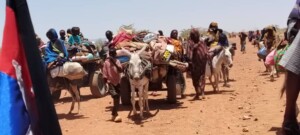Aid urgently required for people fleeing Sudan’s West Kordofan
The area of Lagawa in West Kordofan is witnessing a relative calm after 21 people were killed in an armed inter-communal clash in the Um Khashmin in Ghubeish last week.
 Map showing displacement from Lagawa locality, West Kordofan until October 23 (OCHA)
Map showing displacement from Lagawa locality, West Kordofan until October 23 (OCHA)
The area of Lagawa in West Kordofan is witnessing a relative calm after 21 people were killed in an armed inter-communal clash in the Um Khashmin region in Ghubeish last week. Authorities have requested urgent aid following mass displacement from the region.
Houses in some neighbourhoods were torched, Activist Fatima Deifallah told Radio Dabanga, leading more than 70 per cent of the population to flee to other towns. Approximately nine neighbourhoods are deserted, she said, but number of young people are still in the town and have found refuge at the Lagawa army garrison if they were not able to stay in their homes.
The arrival of the army and Rapid Support Forces stabilised the situation, Deifallah added. The town’s market, one of the largest weekly markets in West Kordofan, has partially opened again.
She further noted that Lagawa has been neglected for a long time, and devoid of basic services such as clean drinking water, electricity, and roads.
Native administration leaders have called on Misseriya and Nuba tribesmen, the parties to the conflict, the West Kordofan government and the Sudan People's Liberation Movement-North under the leadership of Abdelaziz El Hilu (SPLM-N El Hilu), to “listen to the voice of reason and respect the importance of peaceful co-existence,” stressing the need to restore the Rule of Law.
Aid requested
The South Kordofan government reported that more than 2,125 adults and 255 children have fled to Delling. Ibrahim Hamadein, Secretary-General of the South Kordofan government said in a press statement that another 7,606 people sought refuge in Kadugli, capital of South Kordofan.
Following his visit to the area of Delling yesterday, Hamadein said that “the number of displaced people exceeds our current capacity,” and appealed to aid organisations operating in the state “to urgently intervene and provide shelter and food, in addition to health requirements.”
The displaced in Kadugli are also in dire need of aid. They are sleeping on the ground, with a lack of toilets and scarcity of drinking water, according to a Radio Dabanga correspondent in the area.
Kadugli Mayor, Karrar Ahmed, told Radio Dabanga that residents of the state capital have provided provisional support to the displaced, and that the health situation is stable, with limited malaria and infectious cases.
The United Nations Office for Humanitarian Affairs (OCHA) Humanitarian Coordinator, Eddie Rowe, said he is “deeply concerned” about the situation in West Kordofan state and appealed for “peace and an end to the violence” in a statement on Thursday.
Sudan’s State authorities have requested humanitarian organisations to mobilise response and an emergency response team comprised of UN agencies, NGOs and line ministries will be established to coordinate the response, according to OCHA. In addition, state authorities have announced that they will provide security for those delivering assistance. Sudan government’s Humanitarian Aid Commission (HAC) and partners are discussing a coordinated humanitarian mission to the affected area once the situation stabilises.
Cease of hostilities
On Sunday, the parties to the conflict, Misseriya and Nuba, signed a document to stop hostilities in the area of Um Khashmin, after bloody clashes on Friday and Saturday killed 21 and injured 12 people.
The document stipulates the formation of a committee of 14 people from the two parties to the conflict, who will be tasked with organising a peace conference.
Hostilities began after a dispute at Gangaro village, approximately three kilometres east of Lagawa town. On October 13, the Misseriya tribesmen claimed the land, which led to an exchange of gunfire between the Misseriya and Nuba in the market in Lagawa itself, which continued through October 14 and 15. On 18 October, Lagawa was shelled by heavy artillery.
Salah Mohamedi, the media secretary of the National Umma Party branch in West Kordofan, told Radio Dabanga that people consider the document to be as “worthless as its predecessors.” He said he expects that the committee will not be able to bring the parties together, adding that the authorities have failed to arrest any suspects so far.
Incidents of tribal fighting in West Kordofan increased earlier in the year. Early June, Radio Dabanga reported about fierce fighting in Lagawa which left nine people dead. End May, at least six people were killed in the the violence that broke out between two Hamar clans.











 and then
and then